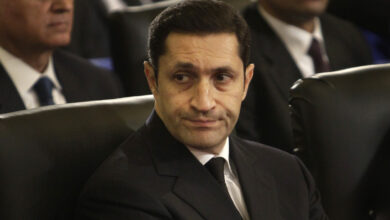The country's top military court decided Thursday to cancel the conviction of Khairat al-Shater, a deputy supreme guide of the Muslim Brotherhood, for reviving a banned group under the regime of former President Hosni Mubarak.
Shater had been sentenced to five years in the case, which was known in the media as the “Shura Council case,” said Abdel Moneim Abdel Maqsoud, the Muslim Brotherhood’s lawyer, according to Al-Masry Al-Youm.
Abdel Maqsoud also said that according to provisions in the law, after the cancellation ruling the judge from the Supreme Military Court should delete the conviction from court records and Shater should regain all the civil rights he was deprived of due to the previous ruling. According to Egyptian law, former prison convicts are not allowed to occupy leading official posts.
The Brotherhood has put Shater forth as candidate to head a new coalition cabinet that would include figures from the political parties represented in Parliament, but the ruling military council rejected the idea.
Abdel Maqsoud noted that the ruling was “a right delayed for very long” and conclusive evidence of the extent of injustice and oppression the Brotherhood suffered from under Mubarak, according to Al-Masry Al-Youm. He emphasized that the reversal is an initial step among many more challenges to “unfair” rulings previously issued against Brotherhood members.
Security services arrested 49 Brotherhood leaders on 2 January 1995 following a meeting of the group’s Shura Council, an internal leadership body. Several months later the arrested members were referred to military court on charges of revitalizing a banned group.
Thirty-four members were sentenced to prison for terms ranging between three and five years, while 15 members were acquitted. Three senior leaders, Essam al-Erian, Mohamed Habib and Shater, each received five years.
After his release, another military ruling in 2008 jailed Shater for seven more years. The Supreme Council of the Armed Forces released the jailed Brotherhood leaders, along with other political prisoners, in March 2011, weeks after the fall of Mubarak.




